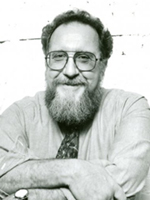
Ron Schiffman
Class of 1961, Architecture; Class of 1965, MS City and Regional Planning
February 26, 2020
“when you want to create an urban environment to make sure it is more democratic and accountable to the people that are there, we have to develop new means of participation….”
Ron Shiffman attended Pratt as an architecture student and never left. He became an urban planner, has been teaching at Pratt since 1967, and in 1963 helped start PICCED, which would eventually become the current Pratt Center for Community Development.
The “Campus” and Social Context in the mid-1950s
Shiffman describes the Pratt campus in the early 1950s and the rise of student activism on the campus in the 1960s: “When I first went to visit Pratt….to say it had a campus would be a stretch….the urban renewal program was beginning or was taking place” around 1956. “Certain buildings were being demolished and the campus was being put together…being assembled. ” In the ’50s…the Civil Rights Movement started occurring. We saw children being blown up in churches. We saw the civil rights activists being hosed down in various different places in the South….And so more and more of our focus began to look at the sort of the neighborhood in which we were surrounded.”
“There were a couple of students that were involved in SDS….and a whole bunch of others were really very active…supporting the strikes that eventually took place. And there were intense discussions that took place around the relationship of the physical environment we lived in, the professions we were pursuing, what the role of an architect and an artist and a planner should be in a society that needed to change.”
Activist Faculty and Surveillance
Shiffman describes the response of the administration to campus unrest in the 1960s. For most of the 1960s, “[the Pratt administration] was very ad hoc. The schools were run by each of the deans and …there was no real oversight into what was going on.” However, when Shiffman was on the faculty in the late 1960s, a more interventionist president, James B. Donovan, blamed faculty and activist students for radicalism on campus. Shiffman recalls that “we also had some people coming in and out of those offices for meetings that were part of the Young Lords and the Black Panthers. And at one of the faculty meetings, James B. Donovan got up and accused the Pratt Center of harboring radicals and left-wingers and criminals, and unbeknownst to us, he had the police observing who was going in and out of the Pratt Center and what they were doing…what they were working on, organizing around civil rights issues or employment issues or economic development issues, meeting with people to discuss issues that were pertinent to the neighbors and neighboring communities, and very benign effort,….even the Gates, were an issue that some people had talked about. Why should we have Gates?….by its charter [Pratt] has to be open to the community.”
The Evolution of the Field of Urban Planning
According to Shiffman, “when you want to create an urban environment to make sure it is more democratic and accountable to the people that are there, we have to develop new means of participation….And so we developed a whole philosophy around urban planning and architecture about participatory processes, as opposed to just working with the head of a church group, but working with the laity in that church, not only working with elected officials, but working with the people at the base and communities.”
Generational Impact
When Shiffman reflected back on the legacy of his generation, after having taught at Pratt for over 50 years and having led the Pratt Center for over 40 years, he noted that “my generation and the generation before me failed in being able to garner the political force to make the changes that are necessary. And I think that’s part and parcel of what you’ve got to do… you’ve got to not only acquire the skills and the technical skills of knowing how to create change or what should be changed, but also how to move public policy to the point where you can achieve those changes.”